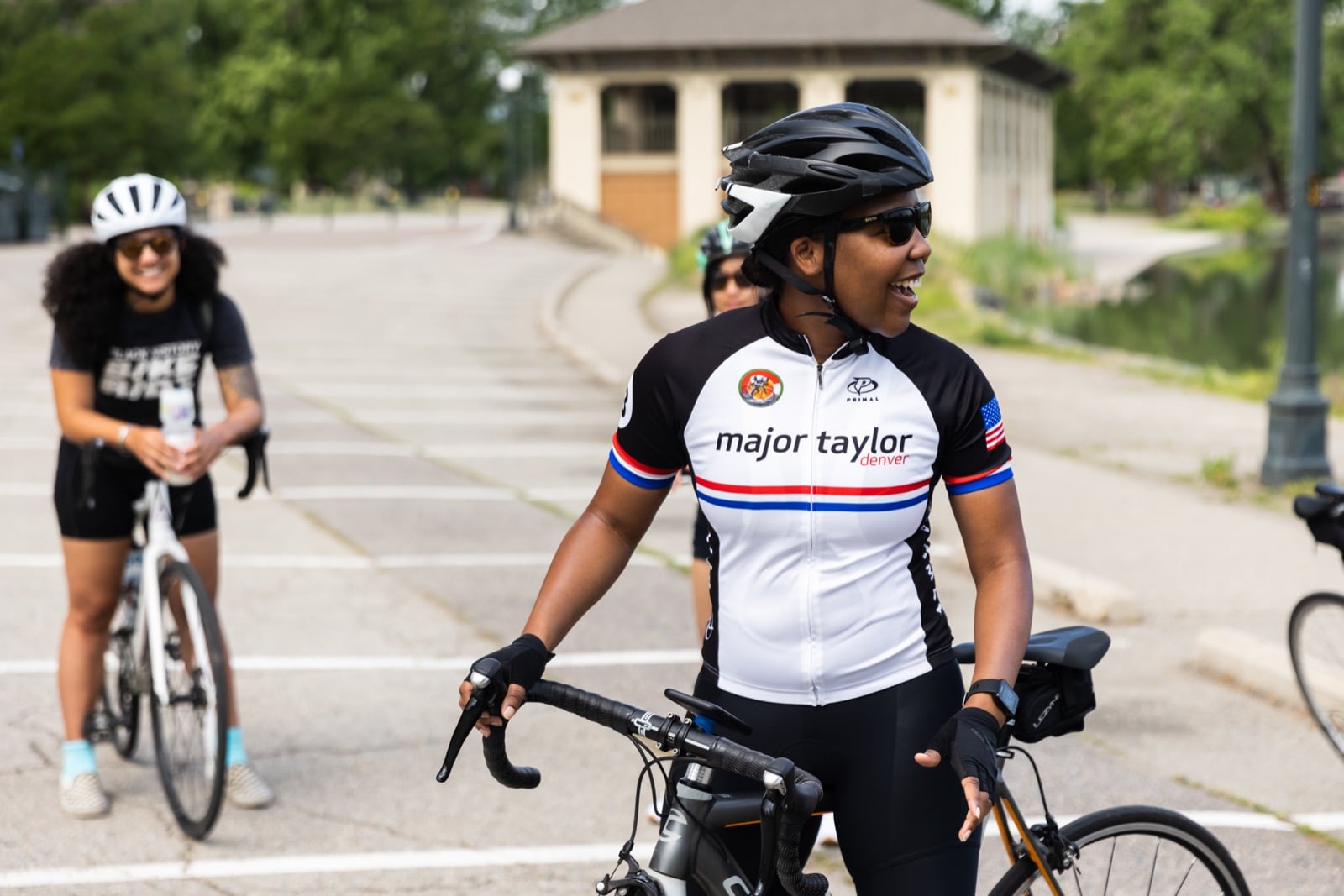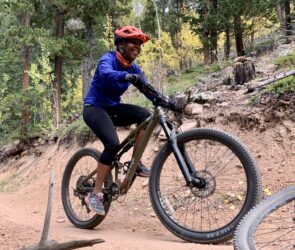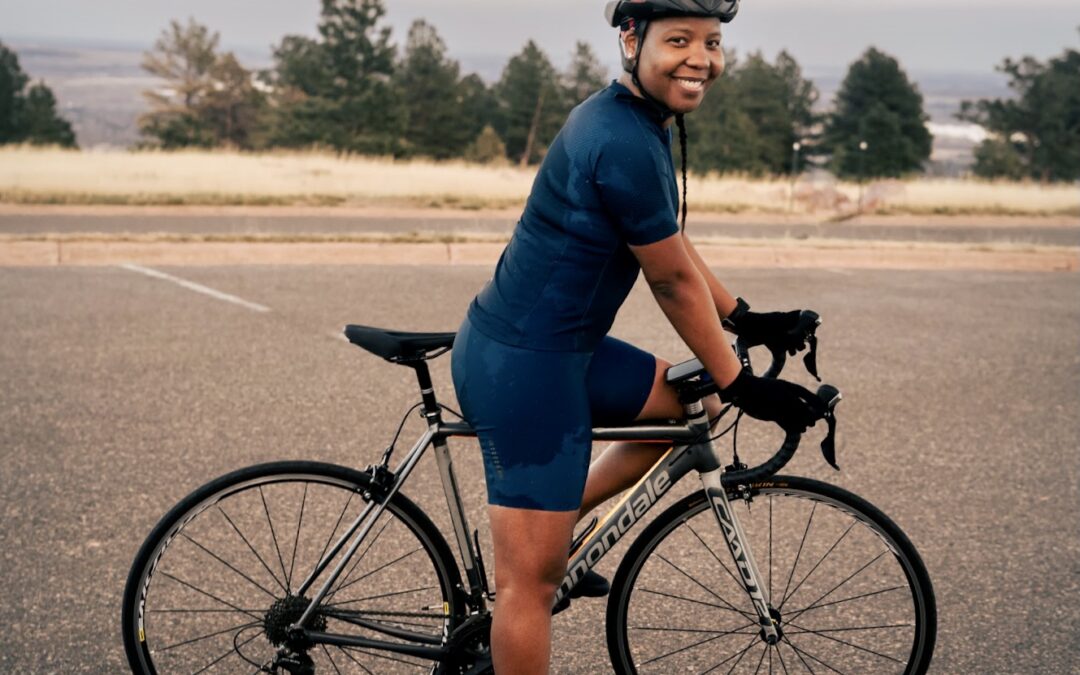Stephanie Puello is the founder of the Denver chapter of Black Girls Do Bike (BGDB), an organization supporting primarily Black women who have a passion for cycling. In our conversation, she talks about completing the TransAmerica Trail in 2016 and about seeking and creating community deliberately and intuitively.
DSP: What empowers you?
Puello: I’m empowered by people and through being a community-centered person. I love creating strong community bonds, and fostering a sense of mutuality and unity. [I’m motivated by] knowing the importance of wellness and how communities are deprived of resources that make wellness possible. Physical wellness opens the door to a good sense of self—self-sufficiency, agency, doing something just because you enjoy it. It’s shifting how we approach our lives. And cycling, compared to other sports, is wellness combined with child-like fun that many don’t have the opportunity to experience.
DSP: What would you say to people who identify community needs?
Puello: Let’s do something about it! [Community challenges] affect all of us. So, I’d say let’s get the community together to talk about the issues, prioritize, identify venues to be heard and for engagement, compile resources, direct people to other organizations already doing similar work, and remind folks that there are opportunities for us to lead the charge and make changes. It’s all about building collective efficacy. While advocating for cycling, my suggestion is to start with something small and specific but scalable, and the work gradually gets bigger.
DSP: How did you get here? What got you interested in active living?
Puello: I came into the leadership space in cycling after completing the TransAmerica “TransAm Trail in 2016 and started deeply reflecting on my experiences when I got back.
While on the TransAm, I noticed how few women and virtually no Black cyclists were on the trail. Halfway through, it occurred to me that despite the trail being 40 years old at the time, I might very well be the first Black woman to traverse it on a self-supported ride. That realization felt so significant, yet disappointing at the same time. It propelled my interest in encouraging and actively supporting more Black women cyclists and in growing a local cycling community.
This led me to my involvement with BGDB. Monica Garrison is the owner and founder of BGDB. It’s a nonprofit with over 100 chapters nationwide and abroad. I created the Facebook group in late 2016, and founded the Denver chapter in 2017. Our first ride was in July 2017. Later on, Brooke Goudy joined as co-leader in 2020. In having this space be for and by Black women, it serves as an acknowledgment of our shared humanity and experiences. Because cycling is a microcosm of society and mirrors its structure and imbalances, the BGDB community serves as a respite from the harsh realities we have to navigate and offers affinity, belonging, representation, support, and shared joy and accomplishment. That cathartic experience that I feel while on my bike is magnified when I’m able to ride with other Black women. And the opportunity to break bread and get to know these women off the bike is similarly enriching.
Through cycling, I also further developed my sense of personal agency and affirmed my own potential, which was liberating to say the least. Cycling has been a vehicle for emancipation for me as it has been for many women. For me, it’s almost less about the action of cycling itself and more about the perspective it gave me and what it symbolizes—spatial justice and a reclamation of who gets to enjoy and benefit from immersion in nature and the outdoors. I also learned a lot about vulnerability. Cycling is an inherently vulnerable sport. You’re often at the mercy of drivers, the quality of infrastructure, and the elements. So cycling pushes you to be self-sufficient, resourceful, and in tune with your surroundings and community.

DSP: What does community mean to you?
Puello: Community is my covenant. I come from a collectivist culture that centers interdependence, interconnectedness, and collective care. So, seeking and creating community to me is both deliberate and intuitive. I’m also extroverted and outgoing, so I’m always seeking opportunities to connect with others and bring people together.
With my cycling community, making connections feels more far-reaching and intentional. Cycling and other recreational activities are less accessible to Black people and those with fewer resources—and that’s by design. We live in a system that doesn’t prioritize or equally purvey holistic wellness or opportunities for leisure, recreation, or rest. On the contrary, rest is often synonymous with laziness or indulgence. So, stepping off the hamster wheel and escaping the tyranny of productivity that controls and takes up most of our time, and instead choosing to partake in an activity that we enjoy for its own sake almost becomes a politic of resistance.
DSP: You’ve shared some of your successes, What are some of the challenges you’ve faced?
Puello: Some of the challenges that I face with respect to BGDB is not having time to grow the chapter the way that Brooke and I want. It is challenging as a volunteer-based organization to fund and support some of the initiatives we would like to start such as a fund to pay for entries for members who want to participate in cycling races and events. With balancing our personal and professional lives and obligations, it’s also difficult not being able to provide as much programming as we would like.
On a personal level, I struggle tremendously with guilt. My parents and most of my family have had challenging lives that have been defined by survival and sacrifice. The idea that I have the latitude and resources to bike, to recreate, to take time off–especially after quitting my job to bike across the country–is still unfathomable and makes me feel guilty that my parents weren’t afforded the same opportunities. Much of what motivates me is the desire to avenge my family’s traumas and to honor all that they have endured. But I very often feel undeserving of the sense of fulfillment that cycling has brought me.
DSP: What other organizations, people, and entities have been involved/a part of your work?
Puello: Some of the organizations and people who have been involved in our work are the local chapter of the Major Taylor Cycling Club of Denver, the SkidMarks Bicycle Club, bike advocates who helped lead the series of protest rides in 2020, JoJé and SaltStick, Pearl Izumi, and REI. Also, the Colorado Mountain Bike Association (COMBA), the VIDA Mountain Bike Series, the Holidaily Brewing Company, Bikes Together, Bicycle Colorado, the Denver Bicycle Lobby, and FoCo Fondo are other organizations that have contributed to our work or have collaborated with us.
DSP: What’s next? What do you hope to accomplish?
Puello: I hope that we can continue to maintain a long-standing presence in the Denver community and that Black women, femmes, and girls across Denver and Colorado know that there’s an organization that is dedicated to supporting and encouraging them. I hope that we can continue to host recurring events that our community is really excited about. I look forward to being able to expose our members to experiences they might have never had such as bikepacking, bike commuting, riding a long distance like a century, bike touring, or even learning how to ride a bike for the first time. Many of these are the kinds of experiences that I have had that have been empowering, and I hope to be able to extend those opportunities to our members. I also want this group to serve a dual purpose in the sense that we might be gathering around cycling, but we are also just part of the Black community in Denver. I want this organization to serve as a space to build connections, get to know others in the [Black] community, bring people together, and support and affirm one other.
Reflections on bicycling and freedom
 People often describe cycling as freeing and I agree, but I don’t only mean in a physical sense. The physical aspect is part of it, in terms of taking control of where I’m going and being free to explore my surroundings. But more acutely, for me, it symbolizes a rejection of the assumptions of undeservingness I’ve been taught to internalize. Through cycling, among other venues, I feel like I started to free myself from these deficit logics, from external and self-imposed rules about which spaces and environments I could enter, and from the conflation of Blackness with lack of opportunity and scarcity. Of course, years of discrimination, segregation, and divestment on a macro level are the sources for what I had internalized, among other systemic and colonial factors. But it took years for me to unlearn this.
People often describe cycling as freeing and I agree, but I don’t only mean in a physical sense. The physical aspect is part of it, in terms of taking control of where I’m going and being free to explore my surroundings. But more acutely, for me, it symbolizes a rejection of the assumptions of undeservingness I’ve been taught to internalize. Through cycling, among other venues, I feel like I started to free myself from these deficit logics, from external and self-imposed rules about which spaces and environments I could enter, and from the conflation of Blackness with lack of opportunity and scarcity. Of course, years of discrimination, segregation, and divestment on a macro level are the sources for what I had internalized, among other systemic and colonial factors. But it took years for me to unlearn this.
…While I did feel that I could attain modest mobility, I still understood that there was a cap. And when it came to sports and activities, adaptive preferences subconsciously guided me and my brother growing up. Activities we weren’t exposed to were cast off as foreign and incompatible, and relatedly, as things only white people do.
So, I am thankful that I was able to interrogate these adaptive preferences and where they stemmed from, and that I ultimately leaned into a developing sense of agency and autonomy…
And that’s why I describe cycling as freeing. It’s about freedom from the deservingness heuristic, freedom to rediscover childlike zeal, freedom to reclaim our streets and neighborhoods, freedom from the trappings of daily life, freedom from truncated aspirations, and freedom from a hyper-individualized society. I am grateful and fortunate that this experience has been both deeply personal and deeply communal. And my goal is really just to extend those opportunities and hopefully encourage others to nurture their sense of wonder and find a little joy and freedom on two wheels.
Conclusion:
The Denver chapter of BGDB hosts monthly group rides and an annual bikepacking trip during the summer. Here’s how you can get involved with Black Girls Do Bike: Local women and femmes are welcome to check out the BGDB Denver Chapter Facebook page for more information on this year’s upcoming rides and programming. Donate at the BGDB Donation page and please indicate in the comments section which chapter you are supporting. You may contact the group via email at bgdbdenver@gmail.com.

